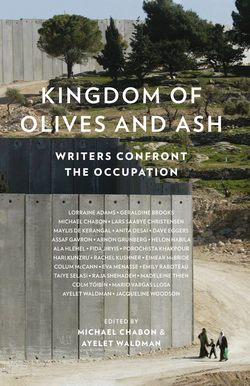Читать книгу Kingdom of Olives and Ash: Writers Confront the Occupation - Colm Toibin, Ayelet Waldman - Страница 14
5.
Оглавление“I love soap,” said Mr. Tbeleh. We were sitting in his office, up a flight of stairs in the main building of the Nablus Soap Company’s headquarters and manufacturing plant. “Really, this is the truth.”
He said it very gravely, almost helplessly, like a uxorious man talking about his wife. He was a handsome guy in his mid-sixties, with Mastroianni cheekbones, a brush moustache, and a good head of dark hair. He had in general a sober and unsmiling demeanor, and yet he struck me as the happiest, or at least the most contented person, I had met over the course of a week in East Jerusalem and the West Bank. He was proud of his factory, a tidy compound of corrugated steel and cinder block structures behind a cinder block wall in Beit Furik, outside Nablus. He was proud of the machinery on his soap production line, the most advanced in all of Nablus, a town known since the early Middle Ages for the excellence of its soap. Most of all, he was proud of his soap. It was made, like all “nabulsi” soap, from three main ingredients: olive oil, water, and caustic soda (a mixture of lime and the refined ashes of the saltwort plant). Mr. Tbeleh’s oil, according to Mr. Tbeleh, was of the first quality, however, and organic, and his other ingredients were costly and pure. Traditional nabulsi soap, nearly odorless, is cut into small blocks, stamped with the soap makers’ trademarks on one side, and wrapped in crinkly paper, but Mr. Tbeleh had introduced fragrances and special ingredients into the recipe—mint, cumin, Dead Sea mud—and his product shipped in a bewildering variety of shapes and packages aimed at various markets around the world: Italy, Japan, France, the Netherlands, the United Kingdom.
For the benefit of Sam Bahour, whose Palestinian American trade organization was considering whether it wanted to help fulfill Mr. Tbeleh’s dream of cracking the US market, Mr. Tbeleh went enthusiastically into considerable detail about his soap and its sale and manufacture, but I got the feeling he would have done the same if we had simply happened by. He really did seem to love soap, which was probably a good thing, I reflected, since he seemed to have had relatively little choice in the matter. His family has been in the soap business since 1611. They have been at it for so long that in Nablus, in the trade, a cutter—the man whose job it is to score and break the giant floor-sized slabs of poured and hardened soap into bars—is known as a tbeleh. Mr. Tbeleh’s destiny seemed to have perfectly converged with his predilection, which was probably the recipe for contentment, I thought—with or without Dead Sea mud. It made me happy just to sit sipping coffee with Mr. Tbeleh, in one of the leather-covered chairs in his dark-paneled office, listening to him go on, in rough but fluent English, about soap. Even when he and Sam got down to business in Arabic I enjoyed the contented rumble of their discussion, though I couldn’t follow a word. I had met a lot of brutalized people and heard a lot of awful stories over the course of the week. What they did was overshadowed, what they needed was denied, what they carried was encumbered by the occupation, and what they owned had been broken, diminished, or taken. All the everyday hardships and obstacles they faced were as much the fruit of the occupation as the extraordinary and terrible ones. But the obstacles Mr. Tbeleh complained about were mostly the kind of thing that any small manufacturer anywhere might face: quality control, competition, access to markets, espionage of the purely industrial variety (apparently there were soap Slugworths out to steal his recipes).
Nothing seemed to have ever discouraged him or weakened his resolve, not even—especially not—the occupation. When, in the early days of his modernization plans, he could not obtain the machinery he needed, he designed and built his own. When settlers in nearby settlements seized wells and springs and cut off Mr. Tbeleh’s access to water—it takes a lot of water to make soap—he found new sources. He had a favorite English phrase, a kind of signature that he interjected liberally into conversation: Of course! Had he designed and built a soap-stamping machine himself, with his own two hands? Of course! Did the Israelis interfere with his supply chain, and his access to water? Of course! Didn’t it take a lot of water to make soap? Of course! Would they really pay thirty dollars in Japan for a bar of premium nabulsi soap in premium packaging? Of course! Everything, to Mr. Tbeleh, seemed to fall into its proper place—however disruptive or aggravating—in the course of things.
As I listened to Mr. Tbeleh talk, and toured the factory floor, where thousands of soap bars stood not in the traditional stacked cones but on special racks, for the months of drying required, I found myself thinking the same thing I had thought while touring East Jerusalem, where well-financed settlers were attempting to drive out the residents of Silwan; or in Hebron, where the local Arab residents had been banned from their own shops and main street; or in Susiya, where the people were forced into makeshift tents after their entire village was seized: These people aren’t going anywhere. Was the occupation a grievous injustice on a colossal scale, so brutal and unremitting that it would lead anyone to consider the appealing alternative of fleeing and never coming back? Of course! And yet here they still were, after fifty years of violence and deliberate degradation, listening to reggae music, shopping in their marketplaces, eating their sticky ice cream, and sending their children out to play. Of course.
